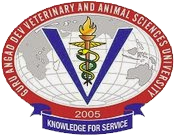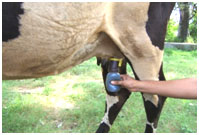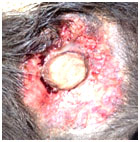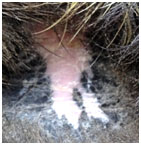

India has a very rich genetic resource of medicinal and aromatic crops as referred in indigenous technical knowledge. Use of herbal medicines in disease cure is becoming important component of medicine in general and finding use in ethno-veterinary medicine also.
The commercial cultivation of medicinal and aromatic crops though is an upcoming area there are no structured programs to support their cultivation in crop diversification schemes. The use of herbal medicines in disease cure not only helpful in controlling menace of residues of synthetic drugs and pesticides in animal products, but also enhances income return for the farmers by cultivating plants with medicinal values which need minimum use of chemical fertilizers and pesticides. Indian industry is also likely to gain by manufacturing and selling herbal based drugs and products by establishing eco-friendly agro-based industries.
The scientists of Guru Angad Dev Veterinary & animal Sciences University Ludhiana have identified and evaluated some herbs for their antibacterial, anti-parasitic-ectoparasiticidal and fly repellent activities. One such herb, evaluated in term of minimum inhibitory concentration, was found to possess good antibacterial activity against common animal disease pathogens such as Staphylococcus aureus, Escherchia coli, Salmolnella typhimurium, Listeria and Bacillus cerius. Also, in vitro drug sensitivity testing of herb against common bovine mastitis pathogens showed good efficacy even against those isolates found resistant to common antibiotics. After getting encouraging resultson in vitro antibacterial property of the herb, the scientists further refined, developed and tested in vivo the two herbal products are under:



Post-milking teat dipping Disbudding wound After Treatment
Before treatment
In a clinical trial, the post-milking use of newly developed herbal teat dip in dairy cows was found very effective in preventing clinical mastitis and in lowering occurrence of new intramammary infections. The product efficacy was found to be comparable to the conventional teat dips available in the market. Further, no deleterious effects were noted of the herbal dip on teat health. A variety of germicides such as iodine, chlorhexidine, sodium hypochlorite etc. have been tried successfully as teat dips in preventing new intramammary infections. However, one major concern that remains with these dips is the possible passing of disinfectant of residues in milk. For this reason, use of herbal medicine as teat dip may be the best answer. Even the WHO has emphasized on the use of the medicinal plants for management of mastitis as they are safer than the synthetic drugs. The Herbal Teat Dip developed is munch cheaper than the products available in the market. It may be mentioned that current annual economic losses due to mastitis in Punjab and India have been estimated to be Rs. 503 and 7165 crores, respectively. Besides direct economic losses to the farmers in the form of decreased milk production, the presence of mastitis causative organisms and drug residues of mastitis therapy in milk poses a major threat to the consumer health. Thus, for a comprehensive mastitis control program, post milking teat dipping is one of its important component essential for preventing mastitis and improving quality of milk production.
GADVASU has also developed herbal ointment for prevention of contamination and healing of wounds in cattle and buffalos calves. Comparative trails with other herbal commercial available in the markets. showed that healing time of wounds treated with two preparations was almost similar indicating good efficacy of newly developed herbal product. The new product is much cheaper and safer than the products available in the markets.
The above technologies/ Product developments are available for transfer to the pharmaceutical industry interested in concept of herbal veterinary medicine. The interested parties may contact Dr. S.N.S. Randhawa, Director of Research, Guru Angad Dev Veterinary and Animal Sciences University, Ludhiana. (Phones: 0161-2553346, 2553347, Fax: 0161-2553356, E-mail. sarnarinder@gmail.com, dr@gadvasu.in)